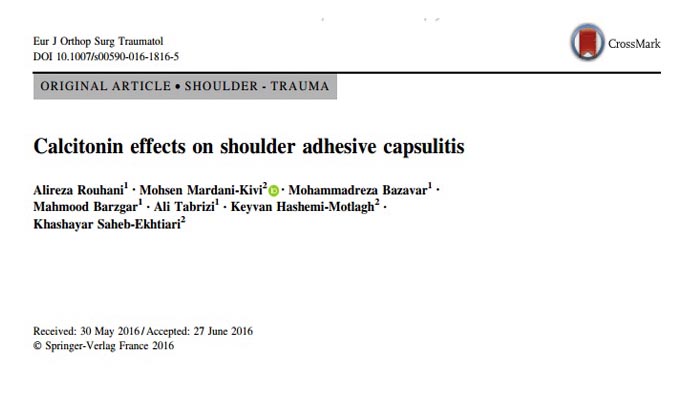- تاریخ درج : ۲۸ فروردین ۱۳۹۶
- تعداد بازدید: 2887
- نویسنده : dr.mohsen mardani-kivi
-

Introduction
Adhesive capsulitis (frozen shoulder) is a relatively prevalent disease of shoulder and affects soft tissue of glenohumeral joint. Signs include painful restricted motion and disability of the patient in daily activities. Calcitonin is a thyroid hormone, and its effectiveness has been demonstrated in painful conditions. The presents study aims to evaluate the effect of calcitonin in treating shoulder adhesive capsulitis.
Method
This double-blinded randomized clinical trial was conducted on 64 patients suffering from shoulder adhesive capsulitis. The intervention and control groups were given intranasal calcitonin and placebo for 6 weeks, respectively. For both groups, physiotherapy and non-steroidal anti-inflammatory drugs were administered correspondingly. The patients were evaluated pre- and post-treatment for shoulder pain and shoulder range of motion (ROM). Shoulder functional outcome (secondary outcome) was evaluated using Disability of Arm, Shoulder, and Hand, Shoulder Pain and Disability Index, and Health Assessment Questionnaire disability criteria.
Results
The mean age of patients in calcitonin and control group was 52.4 ± 4.6 and 53.2 ± 4.9, respectively. Demographic characteristics and pre-treatment scores were similar in both groups (all P > 0.05). In post-treatment follow-up, shoulder pain, ROM, and the patients’ functional scores were significantly improved in both groups (P < 0.001); however, the improvement in calcitonin group was more effective than that of placebo group.
Conclusion
Intranasal calcitonin spray could be an additional safe alternative in shoulder adhesive capsulitis with regard to the efficiency in alleviating pain and improving functional outcome.
-